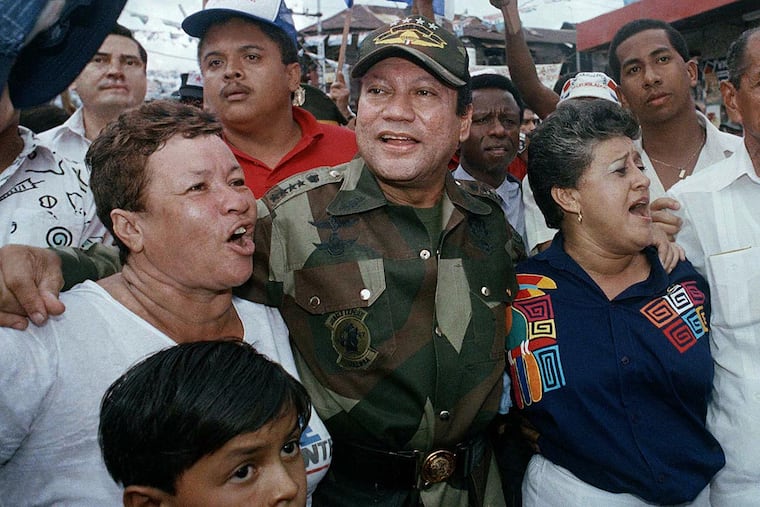Manuel Noriega, former Panamanian dictator, is dead
Gen. Manuel Noriega, the Panamanian strongman and onetime American ally who was toppled from power in a 1989 U.S. invasion and who spent more than two decades imprisoned on drug dealing and conspiracy convictions, died Monday. He was believed to be 83.

Gen. Manuel Noriega, the Panamanian strongman and onetime American ally who was toppled from power in a 1989 U.S. invasion and who spent more than two decades imprisoned on drug dealing and conspiracy convictions, died Monday. He was believed to be 83.
The cause of death was not announced, but Noriega had been in intensive care at a hospital for months after complications from surgery to remove a benign brain tumor.
Panamanian President Juan Carlos Varela announced the death Tuesday morning on Twitter, saying that the passing closes a chapter in the country's history.
A career military man, Noriega led the Panamanian Defense Forces from 1983 until President George H.W. Bush ordered the invasion on Dec. 20, 1989, which followed months of deteriorating relations between Panama and the United States.
Noriega was a polarizing figure for decades after he was led in chains from Panama by U.S. marshals on Jan. 4, 1990, to a federal prison in Miami.
His opponents said Noriega was a brute who killed his opponents and hid millions of dollars in gains from drug and other corruption payments. Retired Army Gen. and former Secretary of State Colin L. Powell once described Gen. Noriega as "pure evil."
Noriega consistently rejected such claims, which he said were trumped up by opponents. He said the Bush administration moved against him after he refused to help American policy in Central America intended to overthrow Nicaragua's Sandinista government and halt a civil war in El Salvador.
"Why, after being the man the United States could count on, did I become the enemy?" Noriega asked bitterly in the jailhouse interviews this reporter conducted with him that led to his 1994 memoir, America's Prisoner. "Because I said no. No to allowing the United States to run a school for dictators [the U.S. military's School of the Americas] any longer in Panamanian territory. No to the request that Panama be used as a staging base for the Salvadoran death squads and the Nicaraguan contras. Lots of no's."
Before his fall from favor, U.S. officials considered Noriega a reliable protector of stability in Panama. As early as his student days in the 1950s, he was an eager informant for the U.S. intelligence services.
Bush justified the invasion by saying, among other things, that the Panamanian leader had declared war on the United States first, that he had made Panama a haven for drug dealers, and that he had endangered open shipping channels through the Panama Canal. Noriega's opponents also charged he had ordered the killing of a prominent political opponent; international monitors, including former President Jimmy Carter, denounced Panamanian elections in the spring of 1989 as fraudulent.
More than 25,000 U.S. troops launched the Dec. 20 invasion, bombarding key Panamanian military installations, destroying the headquarters, and killing and injuring people in a poor Panama City neighborhood. Noriega eluded capture before seeking refuge days later at the Vatican Embassy in the Panamanian capital. Soldiers surrounded the diplomatic building and blasted rock music at a deafening volume.
Noriega claimed that the music had not bothered him but that it drove priests inside the compound to distraction. With no chance of escape, he surrendered to U.S. forces on Jan. 3, 1990.
Noriega was classified as a U.S. prisoner of war under the Geneva Conventions, thereby entitled to visits from the International Red Cross, continued use of his military uniform and recognition of his status as commander - and only member - of the long-defunct Panamanian military, which was disbanded after the U.S. invasion.
In 1992, he was sentenced to 40 years in prison on a drug trafficking and conspiracy conviction after a 10-month trial in U.S. District Court in Miami. Although the Bush administration used the drug charges as justification for the invasion, the proof was surprisingly weak.
The case against Noriega rested on two dozen convicted cocaine felons, all of whom received reduced sentences for testifying.
Noriega's U.S. sentence was reduced to 30 years after three former U.S. officials spoke on his behalf at a sentence-reduction hearing. Just as he was granted parole for good behavior and scheduled for release in 2007, U.S. officials agreed to a French extradition request based on a money-laundering charge.
The U.S. Supreme Court authorized Noriega's transfer to France in April 2010. The following year, France granted his extradition to Panama, where he had been convicted in absentia for human-rights crimes.
Manuel Antonio Noriega Moreno was born in Panama City, most likely on Feb. 11, 1934, although the year of his birth was a matter of controversy. Noriega had once listed the year as 1938 and never cleared up the discrepancy.